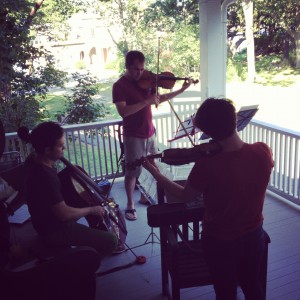Revisiting pieces, revisiting insecurities
Posted August 26, 2013

It doesn’t get much better than this: an impromptu chamber rehearsal outside with two of my favorite musicians, Caroline Shaw and Jacques Wood.
Earlier this month, I had a wonderful week with friends and colleagues in Manchester-by-the-Sea, MA. Despite the picture-perfect New England summer days, the concert nights still managed to create a humidity normally reserved for deep in the Amazon. Fortunately, I packed plenty of handkerchieves and extra shirts to combat the beads of sweat pouring down my forehead.
I look forward to visiting Manchester every year in August, as it means reuniting with some of my favorite colleagues for fun and memorable chamber music experiences. This year we performed the Dvorak Piano Quintet in a house concert, an always charming crowd-pleaser with lots of juicy viola moments throughout its four movements (full disclosure: I was pushing to do Brahms, a Quintet I still have never had the opportunity to perform). This was the third time I had performed the Dvorak Quintet, and relearning it led to a reminder of the wildly different moments I had performed it previously.
The first performance occurred in the small Italian town of Casalmaggiore – where I was for a music festival at the time – in 1999. I was about to start college in the fall, and was brash and immature – I had no sense of ensemble playing, intonation or pacing yet. I guess this doesn’t seem surprising in retrospect, since I was seventeen at the time, but it was all on display, no doubt, when our quintet hobbled through the piece in a brutally hot opera house performance.
I got a second shot at the piece in the first year of my Master’s while at Yale. This time around, we certainly had fun learning and rehearsing the piece over the course of a semester (It is hard to imagine having that much time to learn and prepare a piece now). I still remember Kazu Isomura, the longtime violist of the Tokyo String Quartet, coaching our group: He would stop us at every viola melody and – with his gorgeous Strad viola – demonstrate how they should sound. He was always polite and encouraging, but of course hearing a master on a Strad executing each one with flawless technique and musicality often led to moments of 23-year-old frustration: “Why can’t I sound like that?! He makes it seem so easy and effortless!”
What I did not connect at that time is that Mr. Isomura had probably by this point in his career rehearsed and performed the Dvorak Quintet at least thirty times. I was on my second go-round. No matter what field one is in, nothing can replace real-world repetition and performance as the way towards (seemingly) effortless mastery.
While my third crack at the Dvorak Quintet earlier this month certainly did not come anywhere close to Mr. Isomura’s level of familiarity and mastery, it did help me appreciate being at a more mature point in my own performing career. The instantly appealing melodies of Dvorak’s score seem somehow easier to convey now than they once did. Gone was the sense of struggle, of effort, that used to plague me. Ironically, the more I let myself get out of the way, the more the melodies seem to speak for themselves. Of course this is not what is actually happening – there is still plenty of effort required to execute anything on both a technical and musical level, and any of my musicologist friends would have my head for suggesting the music is “speaking for itself.” But there is a simplicity and a clarity that certainly was not there in my younger attempts at this work. I don’t think this is anything new – it is something all musicians develop gradually over years of performing and maturing and growing. But it is upon revisiting a piece like the Dvorak Quintet – which I have re-engaged with at three very different moments in my life and career – that one can really step back and assess that remarkable – and remarkably personal – journey.
Of course, the simplifying and easing of effort in this most recent performance of Dvorak compared to previous ones could have been related to another critical aspect: the fact that I was lucky enough to play a piece I love with WONDERFUL colleagues. These are musicians who are not only phenomenal players, but genuine friends who I profoundly enjoy making music with – and to present that music-making joy to a sincere and appreciative audience only makes it more rewarding. These elements are easy to overlook or lose sight of in the professional world, where cynicism and the bottom-line can so easily become the dominant mechanisms of decision-making. But audiences are savvy at picking up on whether musicians enjoy playing together or not, and they are even more savvy at noticing if they are being sincerely appreciated or taken for granted.



